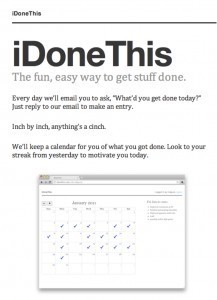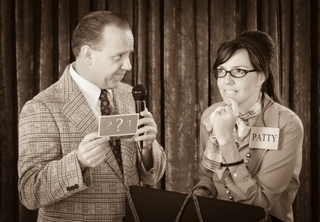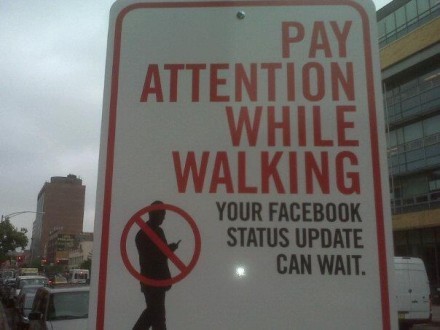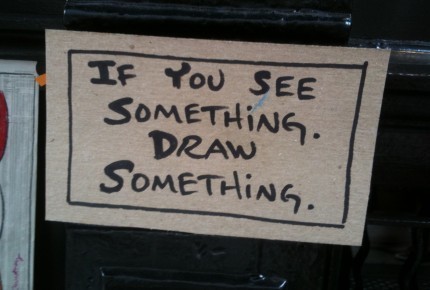Daniel H. Pink's Blog, page 13
October 6, 2011
2 ways to honor Steve Jobs
October 5, 2011
Emotionally intelligent signage meets social media
Here are two that came over the transom this week . . .
(HT: Lots of you)
(HT: Nadya Pagan, Arthur Bushkin, Jeremy Epstein)
October 3, 2011
Monday morning advice from two design icons
This morning, while straining to get my cognitive gears to engage, I stumbled across two tidbits of advice that made the task easier and prepared me for the week ahead.
The first came from Brain Pickings, one of my favorite sites. Proprietress Maria Popova unearthed a 1972 Q&A with the legendary Charles Eames. The whole thing is worth a read, but this exchange stuck with me:
Interviewer: What are the boundaries of design?
Eames: What are the boundaries of problems?
Moments later, reeling from that hip-check to my mind, I learned that someone just executed a business idea I had several years ago. That was irritating — but the pangs of irritation somehow triggered me to remember a line from Karim Rashid's Karimanifesto, where he writes:
"Never say 'I could have done that' because you didn't."
Think on these things, Grasshopper. Happy Monday.
September 28, 2011
Who wants to help shut down some cigarette-puffing, rule-breaking French commuters?
 France's state-owned railway is facing a vexing problem and — mon Dieu! — it's looking for advice from Pink Blog readers.
France's state-owned railway is facing a vexing problem and — mon Dieu! — it's looking for advice from Pink Blog readers.
Here's the le scoop:
Earlier this month, I received an email from Marie-Dominique Bonardi, who'd recently finished reading Drive. She wrote:
I am a professor at Sorbonne University, I teach public relations. I also have my own tiny PR agency in Paris. I come to you with a case and questions.
The company that runs the train in France has a problem in a station. Smoking is forbidden in trains. But a group of people takes one wagon for themselves, and spends the whole journey smoking and preventing other people from using the wagon.
No one managed to stop them. This has been like that for 10 years. Now SNCF really does not know how to fix the issue and one of their directors came to me.
Marie-Dominique reached out to me for advice. And I suggested to her that we crowdsource the problem — because PinkBlog readers have an excellent record of devising great solutions to tough challenges (see one such example here).
So . . . over to you, mes amis. What should the train company do?
Offer your solution in the Comments section below. I'll compile the best (and most interesting) proposals in a subsequent blog post and we'll send all the recommendations to the French. To get us started, I've listed four ideas of my own as the first Comment.
Allons-y!
September 14, 2011
Ask Marcus Buckingham anything you want
 In the last decade, millions of people have come around to the idea that we're better off building on our strengths instead of constantly trying to fix our weaknesses. That change in perspective is due, in no small part, to Marcus Buckingham.
In the last decade, millions of people have come around to the idea that we're better off building on our strengths instead of constantly trying to fix our weaknesses. That change in perspective is due, in no small part, to Marcus Buckingham.
Now you'll have a chance to ask Marcus anything you want on the next episode of Office Hours — Friday September 16 at 11am EDT.
For those of you who haven't been paying attention, Office Hours is our new radio-ish show in which I open the phone lines for an hour to listeners across the planet who can ask me and a special guest questions work, business, life, or any other topic. As we say, it's Car Talk . . . for the human engine.
And for those who really haven't been paying attention, Marcus Buckingham is among of the world's top management thinkers — and co-author of Now, Discover Your Strengths, one of the most influential (and top-selling) books of the past decade.
This week, Marcus launched a new book –StandOut: The Groundbreaking New Strengths Assessment from the Leader of the Strengths Revolution – which includes a powerful new strengths assessment that builds on what he's learned in the ensuing years. (I've taken the assessment. It's really interesting. I might even reveal the results on the show.)
– which includes a powerful new strengths assessment that builds on what he's learned in the ensuing years. (I've taken the assessment. It's really interesting. I might even reveal the results on the show.)
To join us on Friday September 16 at 11am EDT, whether to ask a question or just to listen in, simply call 1 (703) 344-2171 and enter this passcode: 203373#. It's free — and freewheeling.
ADDED BONUS: We'll be giving away copies of Marcus's new book to 24 lucky listeners. The only way to win, though, is to tune in.
To hear previous episodes of Office Hours, visit the show's web page or snag them on iTunes.






September 13, 2011
A cool new (free!) productivity tool
 At the heart of most organizations is a disconnect.
At the heart of most organizations is a disconnect.
Teresa Amabile and Steven Kramer have shown that making progress on meaningful work is the single most motivating aspect of any job. But . . . many people don't know what kind of progress they're making – because their main source of workplace feedback comes only once a year in that hideously awkward and bizarrely formulaic ritual known as the annual review.
Fortunately, several companies and entrepreneurs are now riding to the rescue, armed with techniques and software to irrigate the modern workplace's feedback desert. But last month, I discovered a tool for individuals that – bang for the buck – is one of the most useful yet.
It's called IDoneThis — and here's how it works:
You register for free on the site. Then each afternoon or evening, at a time that you designate, the IDoneThis folks send you an email asking what you've accomplished that day. You reply to the email — and IDoneThis compiles the responses. You can then visit your own private online calendar to remember what you achieved — or didn't — yesterday, last Tuesday, or three weeks ago.
I've been using IDoneThis for about a month now – and I've found it helpful, revealing, and occasionally disappointing because of what it reveals. It's not a magic elixir for anybody's productivity woes. But for me at least, spending 60 seconds each night responding to that IDoneThis email gives me a hint about whether I've really moving forward on stuff that matters.






September 8, 2011
More (somewhat) emotionally intelligent signage in a parking lot
Michael Marx of Gilbert, Arizona, emailed recently to say, "There can never be enough emotionally intelligent signage." And he included this example from the parking lot of a nearby Chili's restaurant:






September 7, 2011
Buy a book, save a life
 Every 45 seconds, a child dies of malaria.
Every 45 seconds, a child dies of malaria.
You might feel helpless in the face of such an overwhelming statistic. But there's something you can do. It's as easy as a few clicks of a mouse, cheaper than a movie date, and will pay you back many times over. Go to End Malaria Day and click on the big red Buy button to purchase your copy of End Malaria: Bold Innovation, Limitless Generosity, and the Opportunity to Save a Life.
End Malaria is two things: It's a book about Doing Great Work, with contributions from more than sixty of the best and brightest experts on the subject. And it's a lifesaver: $20 from the purchase of each book (100% of the Kindle price, 80% of the hard copy price) will send a malaria net to a family in need and support life-saving work in the battle against malaria. Every single copy sold will fight this killer.
End Malaria is joint project of Box of Crayons, The Domino Project, and Malaria No More, whose mission is to wipe out malaria by 2015. With the help of enough smart, generous people (like you!), it can be done.






September 6, 2011
I'll take gender differences for $800, Alex
A: This popular game show presents an elegant environment for studying the effects of gender on competition.
Q: What is Jeopardy?
 Scores of studies have examined the differences between men and women when it comes to competition, but a recent paper called "Girls will be Girls – Especially among Boys" (pdf) takes a clever approach and yields some intriguing results.
Scores of studies have examined the differences between men and women when it comes to competition, but a recent paper called "Girls will be Girls – Especially among Boys" (pdf) takes a clever approach and yields some intriguing results.
In an attempt to understand why men outnumber women in intensely competitive, high-risk fields, two Swedish scientists, Jenny Säve-Söderbergh and Gabriella Sjögren Lindquist, analyzed data from the 2002 season of their native land's version of Jeopardy!.
The rules of Swedish Jeopardy! are very similar to those of the American version: three contestants gaze up at a big board of categories, select clues that are rendered as answers, and respond in the form of a question. Each correct answer earns the contestant money; each incorrect answer has the opposite effect.
Säve-Söderbergh and Lindquist focused on how men and women play the Daily Double. As you may know, three Daily Doubles pop up randomly in each game. Only the contestant who uncovers the Daily Double gets to answer it, and he or she can wager on the answer any amount of their winnings. Säve-Söderbergh and Lindquist wondered if the gender of the Daily Double contestant or the gender of his or her opponents made any difference in how much a person bet.
Their findings: Yes, gender mattered — though not quite in the way the researchers expected.
First, Säve-Söderbergh and Lindquist found that overall women played more conservatively than men regardless of their opponents. On average, they wagered about 40% of their winnings on Daily Doubles, while men wagered about 60%.
Second, women took smaller risks when playing against two men than they did against a woman and a man or against two women. Women wagered about 22% less in male-dominated settings than they did in female-dominated ones. Men's wagers were not affected by the gender of their opponents.
Third and perhaps most interesting, "Although women decrease their wagers when competing in a male-dominated environment, women do not differ from men in their performance in these games."
In other words, women took smaller risks — especially when competing against men — but did just as well as men in their total results.
Of course, as Säve-Söderbergh and Lindquist themselves acknowledge, it's tricky to extrapolate from a game show to real life. But the research does raise some interesting questions — and seems consonant with other analyses showing that women manage their money more conservatively but more effectively than men.
Please add your thoughts below if you'd like — but remember to do so in the form of a question.

















